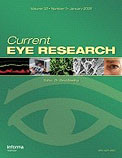Cejka C, Ardan T, Sirc J, Michálek J, Beneš J, Brůnová B, Rosina J. Curr Eye Res. 2011 Jul;36(7):607–13. Epub 2011 May 20. IF: 1.360

Department of Ophtalmology
Abstract:
PURPOSE: Exposure of the cornea to UV radiation from sunlight evokes intraocular inflammation, photokeratitis. Photokeratitis is caused by UVB radiation. It is accompanied by changes of corneal hydration and light absorption. The aim of this study was to examine the effect of two UVB doses on corneal optics in rabbits and to compare these UVB doses with the equivalent exposure of UVB radiation reaching the human cornea fromsunlight. MATERIALS AND METHODS: Rabbit corneas were irradiated with a daily UVB dose of 0.25 J/cm2 or 0.5 J/cm2 for 4 days. One day after finishing the irradiations the rabbits were sacrificed and corneal light absorption measured using our spectrophotometrical method. Corneal hydration was examined using an ultrasonic Pachymeter every experimental day before the irradiation procedure and the last day before sacrificing the animals. RESULTS: Changes in corneal optics appeared after the repeated exposure of the cornea to a UVB dose of 0.25 J/cm2 and massively increased after the repeated exposure of the cornea to a UVB dose of 0.5 J/cm2. The first significant changes in corneal hydration appeared after a singleexposure of the cornea to a UVB dose of 0.25 J/cm2. CONCLUSIONS: Changes in corneal hydration appeared after the exposure of the rabbit cornea to a single UVB dose equivalent to 2.6 hours of solar UVB radiation reaching the human cornea, as measured by UVB sensors embedded in the eyes of mannequin heads facing the sun on a beach at noon in July. Repeated exposure of the rabbit cornea to the same UVB dose evoked profound changes in corneal optics. Although comparison of experimental and outdoor conditions are only approximate, the results in rabbits point to the danger for the human eye from UVB radiation when short stays in sunlight are repeated for several consecutive days without UV protection.
-mk-